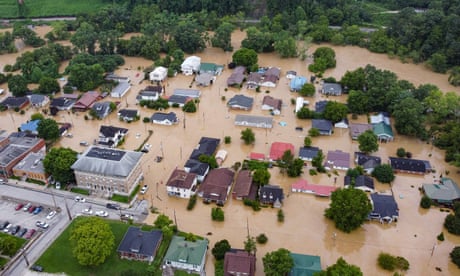- by foxnews
- 08 Apr 2025
Kentucky grapples with effect of climate crisis as floods leave trail of devastation
Kentucky grapples with effect of climate crisis as floods leave trail of devastation
- by theguardian
- 01 Aug 2022
- in news

As the flash floods in Kentucky claim lives and continue to leave behind a trail of devastation, residents and officials in the state are increasingly grappling with the costly impacts of the climate crisis.
Earlier this week, the state saw eight to 10 inches of rainfall in a 24-year period, marking what experts are calling a 1-in-1,000 year rain event. Amid the onslaught of rain and catastrophic flash flooding, at least 26 people have died while dozens more are reported injured.
Kentucky governor Andy Beshear has warned that the death toll will likely continue to rise as officials struggle to reach certain areas of the state that have been badly affected by the floods. On Sunday morning he told NBC it was raining hard in the region and there are renewed warnings of additional flooding.
However, to climate scientists, the answer to such frequent and drastic weather events can be attributed to climate change that has largely been human-caused and expedited.
Jonathan Overpeck, an earth and environmental sciences professor at the University of Michigan, explained that because human activities such as the burning of fossil fuels have significantly warmed the atmosphere in recent years, the atmosphere now holds more moisture than it used to. As a result, whenever rainfall occurs, it is more drastic.
Flash floods happen as a result of torrential rainfall that occurs within a short period of time, often resulting in the water having nowhere to go. Because grounds can often be already saturated, they are unable to absorb all the excess water.
Opeck explained that in addition to more frequent flash floods, Kentucky will also likely experience more tornado risks in the future. Last December, Kentucky faced its deadliest tornado outbreak when numerous tornadoes tore through the state and killed 80 people. Among the multiple tornadoes, one cut through over 165 miles and was nearly half a mile wide.
As the eastern region of Kentucky struggles with rebuilding efforts that will likely take years, residents from the western parts of the state are also feeling the impacts of climate change in various ways.
Steve Fisher, a 61-year old farmer told the Guardian that the floods have driven him to use increased fungicide on his crops due high moisture content.
Additionally, volatile weather conditions have forced farmers like Fisher to change their farming methods and routines. One method Fisher now uses is no-till farming, a technique used to address soil erosion that washes away the topsoil which supports plant growth and helps to retain moisture during long periods of drought.
- by foxnews
- descember 09, 2016
Ancient settlement reveals remains of 1,800-year-old dog, baffling experts: 'Preserved quite well'
Archaeologists have recently unearthed the remarkably well-preserved remains of a dog from ancient Rome, shedding light on the widespread practice of ritual sacrifice in antiquity.
read more


